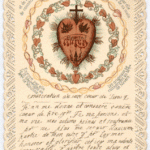 St Francis de Sales had a profound understanding of human nature but also a thorough familiarity with Scripture and the Fathers of the Church, enabling him to place the growth of faith within these complementary aspects of our spiritual lives.
St Francis de Sales had a profound understanding of human nature but also a thorough familiarity with Scripture and the Fathers of the Church, enabling him to place the growth of faith within these complementary aspects of our spiritual lives.
While acclaiming the beauty of faith he also knew people need to grow in it, that there are temptations within that growth. He suggested a tool to help- the tool of prayer.
From the Treatise on the Love of God, Book 2, Chapter 21:
 “Between the first awaking from sin or infidelity to the final resolution of a perfect belief, there often runs a good deal of time in which we are able to pray, as we have seen S. Pachomius did, and as that poor lunatic’s father, who, as S. Mark relates, giving assurance that he believed, that is, that he began to believe, knew at the same time that he did not believe sufficiently; whence he cried out: I do believe, Lord help my unbelief, as though he would say: I am no longer in the obscurity of the night of infidelity, the rays of your faith already enlighten the horizon of my soul: but still I do not yet believe as I ought; it is a knowledge as yet weak and mixed with darkness; Ah! Lord, help me. And the great S. Augustine solemnly pronounces these remarkable words: “But listen, O man! and understand. Art thou not drawn? pray, in order that thou mayest be drawn.”
“Between the first awaking from sin or infidelity to the final resolution of a perfect belief, there often runs a good deal of time in which we are able to pray, as we have seen S. Pachomius did, and as that poor lunatic’s father, who, as S. Mark relates, giving assurance that he believed, that is, that he began to believe, knew at the same time that he did not believe sufficiently; whence he cried out: I do believe, Lord help my unbelief, as though he would say: I am no longer in the obscurity of the night of infidelity, the rays of your faith already enlighten the horizon of my soul: but still I do not yet believe as I ought; it is a knowledge as yet weak and mixed with darkness; Ah! Lord, help me. And the great S. Augustine solemnly pronounces these remarkable words: “But listen, O man! and understand. Art thou not drawn? pray, in order that thou mayest be drawn.”
Ultimately, we have free will, the most generous gift God has given to us. This means we can accept or reject that other profound gift, that of faith.
 “Our Saviour draws hearts by the delights that he gives them, which make them find heavenly doctrine sweet and agreeable, but, until this sweetness has engaged and fastened the will by its beloved bonds to draw it to the perfect acquiescence and consent of faith, as God does not fail to exercise his greatness upon us by his holy inspirations, so does not our enemy cease to practise his malice by temptations. And meantime we remain in full liberty, to consent to the divine drawings or to reject them.”
“Our Saviour draws hearts by the delights that he gives them, which make them find heavenly doctrine sweet and agreeable, but, until this sweetness has engaged and fastened the will by its beloved bonds to draw it to the perfect acquiescence and consent of faith, as God does not fail to exercise his greatness upon us by his holy inspirations, so does not our enemy cease to practise his malice by temptations. And meantime we remain in full liberty, to consent to the divine drawings or to reject them.”
Once we accept the grace and taste the faith we want more and turn to God repeatedly and more in earnest.
“The soul, prevented by grace, feeling the first drawings, and consenting to their sweetness, as if returning to herself after a long swoon, begins to sigh out these words: Ah! my dear spouse, my friend! Draw me, I beseech thee, and take hold of me under my arms, for otherwise I am not able to walk: but if thou draw me we run, thou in helping me by the odour of thy perfumes, and I corresponding by my weak consent, and by relishing thy sweetnesses which strengthen and reinvigorate me, till the balm of thy sacred name, that is the salutary ointment of my justification be poured out over me. Do you see, Theotimus, she would not pray if she were not excited; but as soon as she is, and feels the attractions, she prays that she may be drawn; being drawn she runs, nevertheless she would not run if the perfumes which draw her and by which she is drawn did not inspirit her heart by the power of their precious odour; and as her course is more swift, and as she approaches nearer her heavenly spouse, she has ever a more delightful sense of the sweetnesses which he pours out, until at last he himself flows out in her heart, like a spread balm, whence she cries, as being surprised by this delight, not so quickly expected, and as yet unlooked for: O my spouse, thou art as balm poured into my bosom; it is no marvel that young souls cherish thee dearly.”
Reflection:
What doubts have been predominant in my experience of faith? Can I name them?
What or who has helped me try to resolve these doubts?